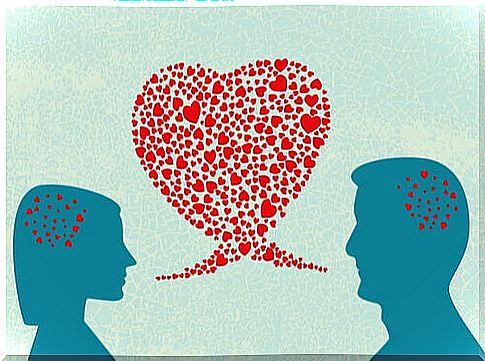Prosthetic Love And Emotional Dependence

Do you know what prosthetic love is? Love and couple relationships are subjects that invite reflection. A lot has been theorized about this feeling, which can be both so captivating and constructive as it is destructive.
Depending on how it is constructed or how it is used, love can motivate us to grow or prevent us from growing. In addition, in a society where the ideal of romanticism prevails, it is sometimes difficult to build a healthy and fluid romantic relationship.
On more occasions than we would like, psychologists meet people whose Achilles heel is called love. Perfectly functional in their work, in their family or social relationships and in other vital areas, these people break down when they are in a romantic relationship. Why ?
The experiences of childhood, and sometimes also in adolescence or early adulthood, leave a deep mark. The relationship with our parents, the parenting styles we grew up with, and low self-esteem can form the basis of a predisposition to toxic relationships.
When a child did not gain the necessary confidence during his childhood, it is difficult for him to show this skill in adulthood. A void is then created in him, a void that must be filled in one way or another.
It is not about “blaming” anyone; people are just not perfect. As a parent, we sometimes make mistakes. And these mistakes are often linked to a system that “forces” us to spend time away from home, to neglect matters as relevant as family, to do everything quickly and to live under stress.
Without realizing it, children feel lonely. They feel that their parents, their point of reference in life, are generally not available to them, and this is when the idea of “abandonment” develops.

Prosthetic love and prosthesis syndrome
When we break a leg and have surgery, we are usually prescribed a wheelchair or crutch. These “prostheses” help us fight against our deficiencies. And, thanks to them, we can continue to walk and lead our lives.
In short, when we physically need a prosthesis, it becomes functional until we can regain our life without it.
Psychologically and with reference to love, the same thing often happens. The absence of our parents, abuse and other childhood traumas cause us to develop an emotional lack or emptiness.
This “hole” that remains in our soul and persists into adulthood is so painful and crippling that we feel the need to find a crutch to function. But surprise! It is not as effective as when we break a leg.
The result is that the partner does not function as hoped, he becomes toxic. On the one hand, the lack we feel generates a feeling of dependence, as we try to ensure that this “abandonment” does not happen again. On the other hand, it is possible that our partner will end up abandoning us, as has happened to us in the past.
It is not magic, it is not a coincidence. We tend to reproduce the same pattern until we have learned the lessons necessary to move forward. We then unconsciously repeat the situations we experienced a long time ago, thus nourishing the idea of abandonment and failure in love.
What if I walk without a prosthesis?
We have to realize that going in search of prosthetic love is not the right strategy. It may work in the short term, but it will be a heavy burden in the long term.
At first, in a whimsical way, it can make us feel like it’s a positive boost to our self-esteem. We think then that we are finally fine, that now “everything will work”. However, this is not how it is.
Before a relationship works for us, it is necessary that the love we think we need come from us.

We grow when we learn to feel good about ourselves with our own inner dialogue. This is why making peace with loneliness is a good start. Force yourself to be alone for a while, make plans on your own, tolerate boredom or the emotions that run through your body.
Hang out with someone because it’s beautiful, easy, healthy, and fun… Not because it’s necessary. At this point, you will no longer depend on any walking prosthesis. You will be walking on your own, and your self-esteem will be good enough to cover your emotional deprivation.
Do you dare to love yourself unconditionally and say goodbye to prosthetic love?










